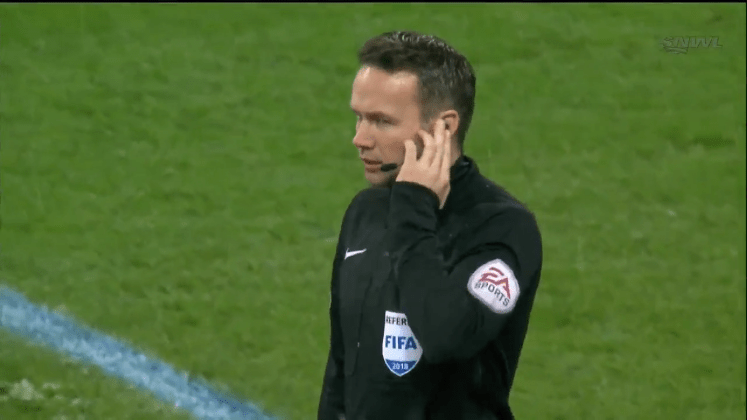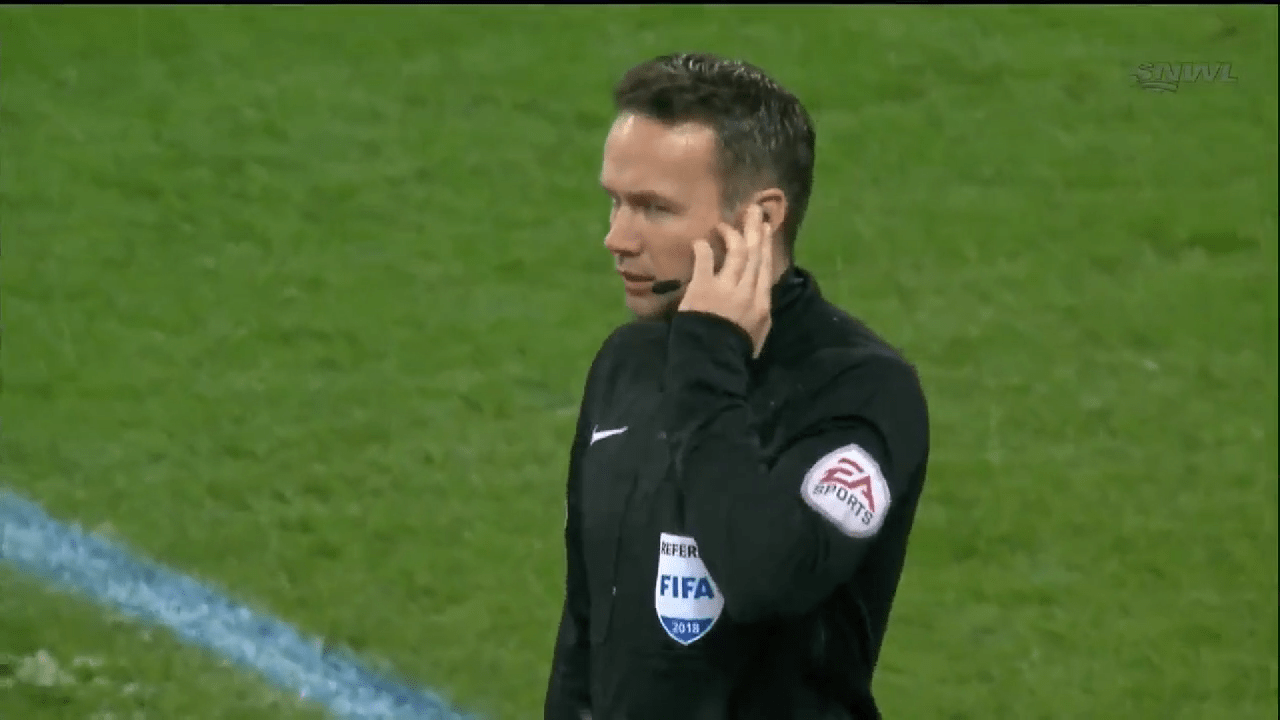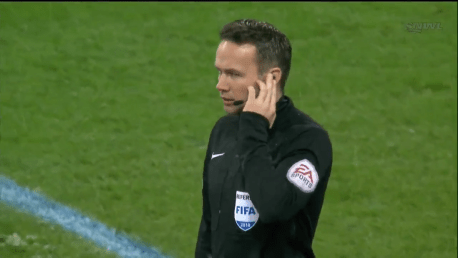VAR is a hot topic in the world of football these days and the arguments for introducing it are well known. The arguments against are seldom presented however, until now!

Video Assistant Referees – VAR for short – has started to make it’s entry into football. It was just announced it will be used in this summer’s World Cup and next season’s La Liga. Leagues like the German Bundesliga and Italy’s Serie A have begun using it already this season. While a lot of people have applauded the introduction of video reviews in football, a growing contingent are starting to worry that it will make “the beautiful game” a whole lot uglier.
Other sports have introduced video reviews as well. In a sport like Tennis, with constant breaks in play and clear cut rules that don’t have to be interpreted, the video review system; “Hawkeye”, has definitely improved the game.
Technology has also already been implemented successfully in football, by the introduction of Goal-Line Technology (GLT). Determining if the ball had crossed the goal line or not used to be problem in football, but that has changed after GLT was introduced. Now, if the ball goes over the line, the referee is notified within a second or two and can blow his whistle for a goal. This has made decisions more accurate (100% in fact), faster to determine, creates less confusion for the fans and less reasons for the players to complain to the referee. Just like “Hawkeye” in Tennis, it’s a rousing success.
While I and basically everyone except the most ardent football purists have welcomed GLT into the game with open arms, there are far more reasons to be skeptical of VAR. It doesn’t have the same advantages GLT has and it introduces far more problems.
1. It kills the flow of the game
Football is known as “the beautiful game” and it’s for good reason. No other major sport has the same free-flowing, uninterrupted build-up to a game-changing goal like football has. We want the least amount of time possible wasted by distractions, but that is exactly what VAR brings.
When it was introduced, we were told that the time spent on VAR would be minimal, but we have learned that is not the case. Often it takes a solid minute or two (sometimes 3) of standing around looking at the referee with either his hand on his ear or by a TV on the sidelines before we get a decision.
It completely kills the flow of the game and it will happen more and more frequently as we continue to use VAR. More on that later. It doesn’t only kill the flow of the game:
2. It kills the atmosphere too
The main difference between football and American sports is the atmosphere. In sports like American Football and Basketball, the constant breaks mean that in order to keep up the energy and noise, there has to be a lot of “in-game ops” while the action is on pause.
Music is constantly played on the PA system, there are t-shirt cannons and loudmouth announcers yammer on about some product for some sponsored segment. This won’t fly over here in Europe. It would be the death of the match day experience we know and love.
The best way to get an American to start liking football is by taking him/her to a match. There’s nothing like the atmosphere in a football stadium, with continuous singing, chants and groans of either elation or despair. There’s nothing fake or forced about it, it flows naturally – just like the game on the pitch – and there is almost never a dull moment. Then along comes VAR to break up the action for a couple of minutes, killing the mood because:
3. It is really confusing for the fans in attendance
There’s simply no way of telling what the refs are thinking about a lot of the time. Rochdale vs Tottenham on Wednesday night was very confusing for everyone who saw the match on TV. But at least for us watching at home, we had the benefit of getting plenty of replays from every angle and commentators trying to figure out what the refs were thinking along with us.
Now imagine what it must have felt like for the fans in attendance. No replays, no way of knowing what had happened or what VAR had (sometimes incorrectly mind you) spotted. On top of that, it was freezing cold and everyone wanted to get on with the game. How discouraging must it have been for Tottenham fans to celebrate a goal, only for it to be taken back away from them? Not only do you get a lead and then lose it, but it affects how you react going forward.
4. You won’t be able to fully appreciate every goal
If you’re the type of person like me who contains your excitement when a goal is scored after a tight offside decision, think about what it must feel like after VAR is introduced.
At least with offside decisions before VAR, it only takes you a second to look over to the sideline and see if the linesman’s flag is raised. With VAR, you will not know if a goal has been given until the referee puts his hand up to his ear, waits a minute for a final decision and confirms it with the Video Assistant Referee.
A goal in football is like nothing else. Because of the rarity of goals in the game, every one of them feels more special. I’m not kidding when I say that some of the best moments in my life has come from celebrating football goals.
Pundits and commentators might have forgotten what it feels like to be in the stands when your favorite team scores a crucial goal, but us football fans haven’t. Some of that would be lost with VAR and give you another reason to stay at home and watch it on TV instead.
5. VAR will also get decisions wrong and it will feel even more unfair
Tottenham’s opening “goal” against Rochdale shouldn’t even have been disallowed. Sure, Llorente was holding the Rochdale defender’s shirt, but the Rochdale defender returned the favour and they were equally at fault. But of course the Rochdale defender fell and that will always get the attention of VAR. More players falling to the ground is exactly what football needs, right?
That’s the issue with referee decisions in football in the first place. It’s often entirely subjective and we spend hours on end after games discussing controversial decisions.
Some decisions are easier to swallow than others. When it comes to centimeters on an offside decision you can’t really blame the ref.
With VAR however, any wrongful decision will result in justifiable blame towards the referees. They will be scrutinized and mocked every time they get something wrong. After all, they won’t just make a wrong decision, but they will have wasted a minute or two just to come to the wrong conclusion.
6. Even more time wasting!
Not only will the minutes wasted looking at video feel slow and frustrating as it happens, but the minutes lost will have to be played at a different point. When exactly? In injury time of course.
Do you know what usually happens in injury time? Time wasting. The least satisfying part of football is when players kick the ball away, spend way too much time setting up a set piece or camp near the corner flag to waste time. With VAR, more of the playing time will be under these conditions. Less free-flowing playing time means a less interesting game.
7. It’s going to negatively affect how referees make decisions
Many people believe the use of VAR will improve once everyone gets used to it, but I beg to differ. Like I said, when a ref fails to make use of VAR, like what happened in the Confederations Cup, the referees gets a lot of scrutiny.
Eventually, refs will be too afraid to judge for themselves and lean more and more on VAR. This has already been notable in tournaments that have already introduced VAR, like the game between Tottenham and Rochdale on Wednesday.
If referees end up too worried about making almost any decision on their own, we’re heading down the wrong way. Would every single shout for handball be checked? Would anyone falling to the floor too easily warrant going to the video review? The game would be unrecognizable.
With VAR in place, the referees will also get incentives to go with whatever VAR has spotted on controversial decisions. If you have to stand around and wait for 3 minutes only to keep the original decision, it will feel like a pointless waste of time.
That might have been what happened when Tottenham were awarded a penalty. To me, the referee had the decision right, with the incident happening outside of the box, even though the Tottenham player fell in it. VAR made the referee check however and gave Tottenham a penalty instead.
8. There will be an added focus on referee decisions
This is one of the things VAR is supposed to help with, not make worse. The thought is that by increasing the referee’s accuracy on decisions from 96% to 98%, there will be less controversial decisions, hence less talk about it. That’s not how it works in practice however.
With the added time spent to make the decisions, the contentious decisions will get even more attention. With VAR, we will be able to make up our mind about what we think the referee should decide to do. If the referee then makes the opposite decision, the frustration will be even greater now that your mind already has been made up. More frustration will lead to more angry tweets, lengthy discussions and TV time on decisions rather than the actual game.
There are way too many rules in football we all disagree on. When is it a handball? How much contact warrants a penalty vs a dive? Tackles and challenges are always heavily discussed. Was the tackle dirty enough to warrant a red card? Did the defender take away a clear goal-scoring opportunity?
A lot of decisions are debatable and very few rules are clear cut Yes/No answers like the offside rule. Even some offsides are argued, like in the game between Liverpool and Tottenham a few weeks ago when Harry Kane was allowed to receive the ball from an offside position because Dejan Lovren made a play on the ball. I think Kane interfered with play by being in an offside position, but apparently some referees disagree.
Closing Thoughts
There are two different types of people who are for and against VAR. There are those who care more about getting decisions right to make it equal and just, and those who care more about the game being as entertaining as possible and keep the magic that makes “the beautiful game” unique.
In the end though, we all want the same thing. Preferably we’d like to snap our fingers and magically make every refereeing decision accurate, so we can rather focus on the skills, the teamwork, the atmosphere and all the other things that makes football the game we love.
Before we make a decision on VAR, we all need to ask ourselves this: How much am I willing to sacrifice in order to make football into a more equitable game?
For me, if it takes away from the experience I get from watching football, I’d rather just keep it as it is. I’d even be skeptical towards using VAR for offsides only.
It would be preferable to what’s being proposed now. The rules are clear cut and offside decisions are made quicker than sorting out penalties, goals and red cards. Still, even if it only takes 15 seconds to double-check – a very generous estimate – that would still mean that I’d have to hold back from properly celebrating goals before they are confirmed.
There is a breaking point for everyone. I don’t believe that anyone would do whatever it takes to get decisions as close to 100% right as possible. Would you use VAR for every throw-in, goal kick and appeal for a free kick? Would you be in favor of doing changes that severely hamper the game like removing the offside rule because it makes it easier for referees? I don’t think so.
Some people are more than comfortable with introducing VAR in it’s current form however. At least now you will know some of the arguments from the opposite side.
Follow @TheVideoScope


